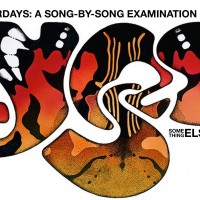It took a few years, but Yes ultimately became comfortable with the idea of making an album without Chris Squire. The issue then became not repeating the mistakes of their most recent studio project, 2014’s Heaven and Earth.
Working in the most modern of ways, Yes had become hermetically sealed. Frontman Jon Davison collaborated with individual members of the group, then they completed Heaven and Earth either with additional overdubs or through remote recording. The resulting album never coalesced, instead sounding like what it was: a set of songs made separately, recorded separately and feeling, in fact, completely separate from one another.
Then Squire was suddenly gone. “We don’t underestimate the impact” of his 2015 death, Steve Howe tells the Oakland Press. Still, Yes’ de facto leader notes that this terrible loss was “some time back, and we’ve done a lot of work since that happened, and I guess we’ve become a better team – a closer team. We’ve suffered. That was what we had to contain.”
Unfortunately, The Quest appeared to be making the same mistakes all over again. Squire is, of course, still gone. But so is the sense that Yes can work in the same room together, as a group. Howe is sole songwriter on “Leave Well Alone,” with Davison again serving as his in-person foil. But Yes’ West Coast contingency completed their rhythm parts for the album’s multi-segment fourth song then mailed them over, while Howe served as the meatball-surgeon – wait, make that “producer.”
This time, of course, it wasn’t a matter of choice. Pandemic lockdowns required a certain compartmentalization for a lineup sprinkled around the globe. Nevertheless, the track listing for 2021’s The Quest can certainly read like a series of solo thoughts – and that didn’t bode well.
Thankfully, Steve Howe clearly has a better handle on how to goose Yes back toward their narrative ’70s hey day, versus the lite-rock prog of Heaven and Earth. “Leave Well Alone” is stronger because of it. Perhaps this came down to a matter of trust, or maybe Howe – who somehow withered into an underrated creative presence in Yes – should have been given a freer reign all along.
His solo albums were a modern-era font of content for Asia albums, which arrived at a far more regular clip: Asia’s original lineup released three studio albums between 2008-12, while Yes has issued just four in the last two decades. A prior relationship on Howe’s 2011 solo project Time also brought smart orchestrator Paul K. Joyce to The Quest.
Crucially, Howe seems to have a much firmer grasp on Yes’ larger journey, certainly when compared to drive-by Heaven and Earth producer Roy Thomas Baker.
“We had to get things in a mode where the mixing and the bass playing in particular was credible and satisfactory,” Howe told the Press, “but more than that, that it had respect for what’s come before and taking the styles of all the past members of Yes and conglomerating them into sort of a new Yes. That was my goal.”
He eagerly leads the way, adding contrasting elements of Spanish guitar and the koto, a Japanese 13-stringed acoustic instrument. The wider results are still a bit too polished at times, a bit too poppy. But at least Yes sounds like a unit here, and they seem to have re-discovered their nerve.
In fact, no song from The Quest thus far has showed a bolder collective knack for musical twists and turns, as Yes layers in spiraled instrumental asides, lovely unaccompanied vocals and a suitably outsized finale – all to the accompaniment of a notable bass pluck or two from hand-picked Squire successor Billy Sherwood.
It’s nothing earth-shakingly new, to be sure. But “Leave Well Alone” takes several more strides back toward Yes’ well-worn but once seemingly lost original path – thanks to Steve Howe.
- The Bright Spots in George Harrison’s Troubled ‘Dark Horse’ Era - December 29, 2024
- The Pink Floyd Deep Cut That Perfectly Encapsulates ‘The Wall’ - November 29, 2024
- Why Pink Floyd’s ‘The Endless River’ Provided a Perfect Ending - November 11, 2024


